![]() This list of topics provides an introduction to various aspects of Australian history, heritage, and culture. Each listing includes links to a number of sources of information held on this site. It is intended to expand the list to cover a wide range of issues. There are thousands of different topics that can be added to the site, so there is much work to be done in adding more topics over time. If your favourite, or most-wanted, topic does not appear here, please bear with us; if you want to see a particular topic added, you can place a suggestion in the comments section. The latest posts on the site can be viewed here.
This list of topics provides an introduction to various aspects of Australian history, heritage, and culture. Each listing includes links to a number of sources of information held on this site. It is intended to expand the list to cover a wide range of issues. There are thousands of different topics that can be added to the site, so there is much work to be done in adding more topics over time. If your favourite, or most-wanted, topic does not appear here, please bear with us; if you want to see a particular topic added, you can place a suggestion in the comments section. The latest posts on the site can be viewed here.
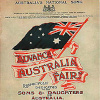 Advance Australia Fair: How the song became the Australian national anthem
Advance Australia Fair: How the song became the Australian national anthem
The story of how “Advance Australia Fair” became Australia’s national anthem. The song was written by Peter McCormick in 1878, and comprised four verses. The song gained a significant level of popularity, and in 1984 it was chosen as Australia’s anthem (as a version consisting of two verses).
* See also: 1) Advance Australia fair [Australia’s national anthem, 1984]; 2) Advance Australia Fair [music videos].
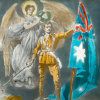 Anzac Day
Anzac Day
Articles, letters, and poems regarding Anzac Day, the Anzacs, the Gallipoli landings, and the Dardanelles campaign. Anzac Day is commemorated each year on the 25th of April; it was established as a way of paying homage to those who served and died in the Dardanelles campaign (1915), during the First World War (1914-1918); however, the day is now used to pay tribute to those who served and died in all wars, military conflicts, and peacekeeping operations. The first Anzac Day commemoration was held in 1916.
 The Ashes
The Ashes
The Ashes is a cricket competition played between Australia and England. It has been an ongoing event since 1882, the year in which an Australian cricket team beat the English team at Kennington Oval. The origin of “the Ashes”, as a term, comes from a humorous “obituary”, regarding the English team’s loss, placed in The Sporting Times (London), which mourned the death of English cricket. As a further extension on the joke, when the English cricket team came to Australia, a small terracotta urn containing “The Ashes” was presented to the English team’s captain.
* See also: Under the Southern Cross I Stand [the Australian cricket team’s victory song].
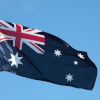 Australia Day
Australia Day
A list of various articles regarding Australia Day. In early years it was commemorated as the First Landing, then as Anniversary Day, then as Foundation Day. It was also known as ANA Day, due to the widespread campaigning by the Australian Natives’ Association for the day to be celebrated as a national holiday.
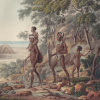 Australian Aborigines
Australian Aborigines
A brief list of articles about the Australian Aborigines. Although the list is a small one at this stage, it is intended to expand it with entries regarding Aboriginal culture, examples of conflict between Aborigines and European settlers, instances of Aborigines being referred to as a “dying race”, the gaining of the right to vote for Aborigines, reports of inter-tribal warfare, and more.
 Australian inventions and innovations
Australian inventions and innovations
Australians have been instrumental in developing various inventions and innovations. This list looks at some of them, including the very useful Black Box for civil aircraft, the humble Hills Hoist, and the miraculous bionic ear.
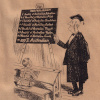 Australianism
Australianism
A collection of items promoting, or relating to, Australianism (an idea which, broadly speaking, relates to Australian patriotism, nativism, and cultural nationalism). Includes articles regarding the promotion of Australian cultural independence, Australian political independence, and overarching loyalty to Australia.
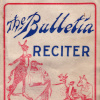 Australian literature
Australian literature
A brief list of articles about Australian literature. At this stage the list primarily consists of links to biographies of, and lists of works by, various Australian writers; however, it is intended that the list shall be expanded with a number of articles about Australian literature in general.
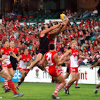 Australian Rules Football
Australian Rules Football
Australian Rules Football is the most popular sport in Australia, with thousands of amateur teams playing in local competitions, along with professional-level teams competing nationally. The game is usually referred to as “Aussie Rules”, “AFL”, “footy”, or “football”. Australian Rules Football is the main code of football played in all states of Australia, except for New South Wales and Queensland, where rugby predominates. Aussie Rules is also played internationally, albeit on a very small scale.
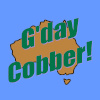 Australian slang
Australian slang
A collection of Australian slang words and phrases. Some are in current widespread use, whilst others are not; some may be derived or taken from overseas slang, but most are unique to Australia.
 The Battle of Beersheba
The Battle of Beersheba
A list of articles about the Battle of Beersheba. This was a military action fought between Allied forces against troops of the Ottoman Empire in the area in and around the town of Beersheba (now a city), in Palestine. The battle took place on 31 October 1917, during the First World War (1914-1918). The battle is especially known for the charge of the Australian Light Horsemen, which was one of the last great cavalry charges in military history.
* See also: 1) The Battle of Beersheba (1917) (an IAC article about the battle); 2) The charge of the Australian Light Horse at the Battle of Beersheba (an article about the famous photograph of the charge of the Australian Light Horse).
![]() Biographies
Biographies
Links to a number of brief biographies of some famous, and not-so-famous, Australians. Most of these biographies are of authors and poets; however, it is intended to expand the collection into other fields as well.
 Books and booklets
Books and booklets
A list of various books and booklets of Australian literature. The complete text of each publication is provided. A small second list has been added, to include some lengthy leaflets, broadsheets, and pamphlets.
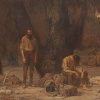 The Burke and Wills expedition
The Burke and Wills expedition
A list of articles about the ill-fated Burke and Wills expedition, which set out in 1860 with the aim of exploring the Australian interior and finding a suitable path for the Australian Overland Telegraph Line.
* See also: The Burke and Wills expedition (1860-1861) (an IAC article about the expedition).
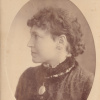 Cabinet cards
Cabinet cards
Cabinet cards were a development in photography in the 1860s, which arose from the popularity of the cartes de visite (visiting cards, with photographs). Cabinet cards were about 2.5 times larger than the cartes de visite. The surviving examples allow us to see the faces and fashions of Australians of yesteryear.
* See also: 1) The IAC online collection of cabinet cards (there are many more which are yet to be scanned and uploaded); 2) Photography prices (regarding cartes de visite and cabinet cards).
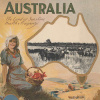 Calendar of Australian history and culture
Calendar of Australian history and culture
This list is a calendar of various events which are considered to be significant in Australian history and in the development of Australian culture.
* See also: Timeline of Australian history and culture (a chronological listing of significant events in Australian history).
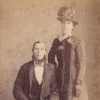 Cartes de visite
Cartes de visite
Cartes de visite (visiting cards, with photographs) were a phenomenon in Australia in the mid to late 19th century. Many of them survive into modern times, thus giving us a glimpse back in time, showing us the faces and fashions of Australians of olden days. In 1866, cabinet cards were introduced into Australia, which were a larger version of the cartes de visite.
* See also: 1) The IAC online collection of cartes de visite (there are many more which are yet to be scanned and uploaded); 2) Photography prices (regarding cartes de visite and cabinet cards).
 Christmas in Australia
Christmas in Australia
Various articles, poems, and stories regarding Christmas in Australia. This list includes several Australian Christmas postcards (including some of a patriotic style), as well as some Christmas cards.
 The discovery of Australia
The discovery of Australia
A chronological list of early ocean-going explorers who discovered parts of the Australian coastline, including Willem Janszoon (Dutch) in 1606, Dirk Hartog (Dutch) in 1616, Abel Tasman (Dutch) in 1642, James Cook (English) in 1770. The outline of Australia was gradually mapped by successive Dutch and British explorers. Matthew Flinders was the first explorer to circumnavigate Australia.
* See also: Explorers.
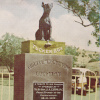 The dog on the tucker box
The dog on the tucker box
A list of articles regarding the Dog on the Tucker Box poem and the associated famous statue (five miles from Gundagai); as well as some postcards with photos of the Dog on the Tucker Box.
* See also: The dog on the tucker box (Gundagai) (an IAC article which gives some historical information about the Dog on the Tucker Box poem and the statue).
 Drop Bears
Drop Bears
Drop Bears (Thylarctos plummetus) are a native Australian mammal, which can be found in bushland areas, especially in those habitats with a dense distribution of trees and a high level of canopy cover. Drop Bears are not usually dangerous to humans; however, if a Drop Bear feels threatened, or perceives that its offspring are facing a real and immediate danger, then it will not hesitate to defend itself and its young. Bushwalkers should remember the old warning regarding Drop Bears: “Look up, and stay alive!”
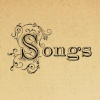 Early music
Early music
Australian music of a more formal style (not including folk music), from the 1850s to the 1950s, with links to music videos of those songs (most of which are audio recordings).
* See also: 1) Folk music and bush music; 2) Rock music and pop music, for pop and rock (from the 1950s up to the present).
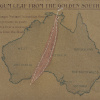 Ephemera
Ephemera
A collection of various ephemeral items, including postcards, cabinet cards, cartes de visite, certificates, Miner’s Rights, miscellaneous photographs, and various other items. The collection includes a number of postcards from Australian soldiers from the era of the First World War (1914-1918).
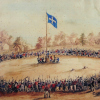 The Eureka Rebellion
The Eureka Rebellion
Various articles relating to the Eureka Rebellion of 1854, the Battle of the Eureka Stockade (3rd December 1854), the subsequent Eureka trials, and some of the leading people involved.
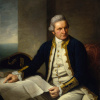 Explorers
Explorers
A list of explorers who searched for Australia Incognita, mapped the Australian coastline, or explored the inland country of Australia. The list includes those who explored by sea (including the early European sailors who discovered Australia), as well as by land.
* See also: The discovery of Australia.
 Folk music and bush music
Folk music and bush music
A list of folk music and bush music, with links to music videos of those songs. The list mainly consists of traditional home-grown productions, although it also includes some early Australia-related British songs which have embedded themselves in the Australia folk music scene, e.g. “(Bound for) Botany Bay” and “(Bound for) South Australia”. Also included are some modern productions, e.g. “Give Me a Home Among the Gum Trees” and “True Blue”.
* See also: 1) Early music, for early Australian music of a more formal style (not including folk music), from the 1850s to the 1950s; 2) Rock music and pop music, for pop and rock (from the 1950s up to the present).
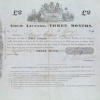 Gold Licenses (Victoria)
Gold Licenses (Victoria)
Information on the history of Gold Licenses in Victoria, where they were introduced in 1851. The excessive cost of the Gold Licenses, and the oppressive (and sometimes brutal) manner in how the police carried out the Gold License regulations, led to the Eureka Rebellion of 1854. In due course, following the Battle of the Eureka Stockade, the Gold License was replaced by the Miner’s Right.
* See also: Gallery of Gold Licenses (Victoria) (with links to the larger images and transcriptions of the documents).
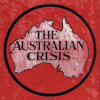 Invasion and takeover stories
Invasion and takeover stories
A list of novels and short stories regarding an invasion, takeover, attack against, or an overwhelming threat to Australia. Also included are some reviews of such stories. The possibility of an invasion or a takeover of the nation has intrigued many Australians, and there have been novels published on those themes right up into modern times.
 Kangaroo and Map stamps
Kangaroo and Map stamps
A list of articles about the “Kangaroo and Map” stamps, as well as links to scans of several postcards with those stamps.
* See also: The Kangaroo and Map stamps (1913) (an IAC article about the origins of these unique and iconic stamps; the article includes images of the various denominations of the Kangaroo and Map postage stamps).
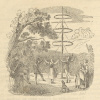 May Day
May Day
A list of early May Day events and poetry. May Day has long been observed in European cultures, as a celebration of the first day of summer, as well as being connected with notions of romance and fertility. Public celebrations have included dancing around the Maypole and the crowning of a Queen of May. In modern times, May Day has been associated with the celebrations of labour movements, although those events are distinct from the traditional May Day festivities.
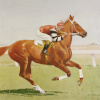 The Melbourne Cup
The Melbourne Cup
The Melbourne Cup is the most famous horse race in Australia. It began in 1861 and has been held every year since. It is held on the first Tuesday in November. The Cup is a race for thoroughbred horses, three years old and over, with a prize pool of several million dollars. Betting takes place all around Australia, with the Melbourne Cup being known as “the race that stops a nation”.
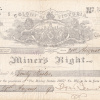 The Miner’s Right
The Miner’s Right
Information on the history of the Miner’s Right, which was introduced in Victoria in 1855, following the Eureka Rebellion of 1854. The Miner’s Right was created as a replacement for the Gold License (which had been introduced in Victoria in 1851). The owner of a Miner’s Right was not just awarded certain rights with regards to mining, but was also entitled to voting rights as well. The concept of the Miner’s Right was subsequently copied by other states in Australia.
* See also: 1) Gallery of Miner’s Rights (with links to the larger images and transcriptions of the documents); 2) The legislative passage of the Gold Fields Law Amendment Bill [extracts from the Votes and Proceedings of the Legislative Council, Victoria, 1855].
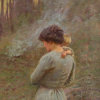 Mother’s Day
Mother’s Day
Information on the history of Mother’s Day, concerning both its appearance in Australia and its American origins. Includes a list of articles regarding Mother’s Day in Australia.
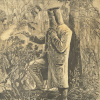 Ned Kelly: Australian bushranger
Ned Kelly: Australian bushranger
Edward Kelly, commonly known as “Ned Kelly”, is Australia’s most famous (or infamous) bushranger. He spent several years operating as a wanted outlaw in Victoria and southern New South Wales. He was finally caught at Glenrowan, following a shoot-out between the Kelly Gang and the police. The notorious Ned Kelly was put on trial for murder, convicted, and subsequently hung.
* See also: 1) The birth of Ned Kelly; 2) Poetry by Ned Kelly [1878]; 3) The Complete Inner History of the Kelly Gang and Their Pursuers (a book written by J. J. Kenneally).
 New Year’s Day
New Year’s Day
A list of various items about or relating to a New Year’s Eve or to a New Year. This list includes articles, poems, stories, and other items (such as ephemera, especially postcards).
 NightCafé AI art
NightCafé AI art
An article about NightCafé Studio, an Australian company which provides people with the tools to create AI-generated images. NightCafé is one of the best AI art sites in the world (and it’s free to join and use). As the NightCafé site is used by people from all over the globe, the site itself is not necessarily an example of Australian culture; however, it is a good example of a successful Australian enterprise.
This article includes links to the winners of hundreds of the daily AI art competitions held by NightCafé. See: NightCafé AI art competitions, 1-100, 101-200, 201-300, 301-400, and 401-500.
 Obituaries
Obituaries
It is intended to include various obituaries on this site; not only of famous artists, authors, military heroes, poets, sportspeople, and politicians, but also of ordinary people. The intention is to especially include obituaries of old colonists and settlers. Usually the obituaries included will be those of a sizable nature, giving some details of the person’s life. It is also intended to add various examples of obituary poetry; not only about people who are famous, but also regarding ordinary Australians.
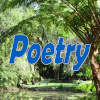 Poetry and songs
Poetry and songs
Links to lists of poetry and songs. These lists include poetry and songs which are 1) written by Australians, 2) created in Australia, and/or 3) written regarding Australia (or are of relevance to Australia).
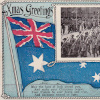 Postcards
Postcards
A collection of various postcards. These include Christmas postcards, patriotic postcards, and postcards from Australian soldiers (especially from the era of the First World War). These postcards show pictures of Australian architecture, places of interest, native plants, and native animals. Some of them have the well-known Kangaroo and Map stamps.
* See also: 1905 postal regulations for postcards (divided and undivided backs).
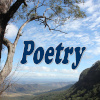 Recommended poetry
Recommended poetry
This list includes some of the best poetry produced by Australian writers. Whilst choosing the best of Australian poetry is a subjective matter, it is believed that these poems represent some of the best, or most enjoyable, poetic works that our nation has to offer.
 Remembrance Day
Remembrance Day
Various articles, letters, and poems regarding Remembrance Day. Remembrance Day is commemorated each year on the 11th of November; it was established as a way of paying homage to those who fought and died during the First World War (1914-1918); however, the day is now used to pay tribute to those who fought and died in all military conflicts and wars.
* See also: The Ode of Remembrance.
 Rock music and pop music
Rock music and pop music
Australian rock and roll music, popular music, and Top 40 hits. The list includes links to music videos of various songs, singers, musicians, and groups, concentrating on pop and rock from the 1950s up to the present.
* See also: 1) Early music, for early Australian music of a more formal style (not including folk music), from the 1850s to the 1950s; 2) Folk music and bush music.
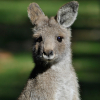 Significant Australiana
Significant Australiana
A list of significant Australiana, including: Animals; Architecture; Art; Artists; Authors; Books; Bushrangers; Clothes; Entertainment; Explorers; Fictional characters; Flora; Food; Icons; Landmarks; Military; Music (Folk songs and early songs; Singers; Songs); Poetry; Rebels and rebellions; Sports; Stories and yarns.
 Significant events and commemorative dates
Significant events and commemorative dates
A list of commemorative dates and historical events which are significant in terms of Australia’s national identity and culture. The list includes both past events and current commemorative occasions.
 Timeline of Australian history and culture
Timeline of Australian history and culture
This list is a timeline of various events which are considered to be significant in Australian history and in the development of Australian culture. The deaths of various significant people are included; although their births, which were not significant at the time, are not listed — however, the births of some significant people are included in the “Calendar of Australian history and culture”.
 Under the Southern Cross I Stand [the Australian cricket team’s victory song]
Under the Southern Cross I Stand [the Australian cricket team’s victory song]
This poem, or chant, is one used by the Australian cricket team as their “victory song”. Traditionally, it is recited by the team after winning a game of cricket. The origins of the verse hark go back to the 1890s patriotic song “Australia; or Heart to Heart and Hand to Hand”, written by the Rev. Thomas Hilhouse Taylor (1861-1925).
* See also: The Ashes.
 Valentine’s Day
Valentine’s Day
A list of articles and poems pertaining to Valentine’s Day. The popularity of this occasion has waxed and waned over the years. It was originally a Christian feast day to commemorate Saint Valentine. In modern times, it is regarded as a special day when one should celebrate romance with one’s lover or sweetheart, and express one’s romantic feelings.
* See also: Saint Valentine’s Day (an IAC article regarding the history of Valentine’s Day in Australia).
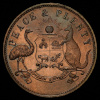 Wages in Australia
Wages in Australia
Various reported weekly wages, earned by Australian workers in the country’s early history, in a variety of occupations. The list was created to give some context to amounts of money which are mentioned in various articles; it includes wages from the 1850s to the start of the 20th century.
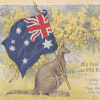 Wattle Day
Wattle Day
Articles, letters, and poems regarding Wattle Day, the Wattle Day League, and wattle trees. Wattle Day is a patriotic event which celebrates the first day of spring, encourages an appreciation for Australian flora, and aims to encourage national sentiment.
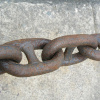 Links
Links
Various links which may be useful for those researching Australian history, culture, and associated fields.
Updated 24 May 2024
Leave a Reply